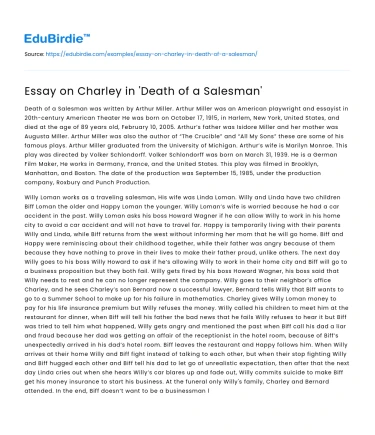Introduction
Arthur Miller's "Death of a Salesman" is a poignant exploration of the American Dream's promises and failures, carefully constructed through its complex characters. Among these characters, Charley stands out as a figure of pragmatism and stability, providing a stark contrast to the play's protagonist, Willy Loman. Charley represents a grounded approach to life, embodying the ideals of hard work and realistic expectations, which Willy struggles to reconcile with his delusions of grandeur. This essay examines Charley's role in the play, analyzing his function as both a foil to Willy and a representation of the attainable American Dream. By highlighting Charley's characteristics, interactions, and the overarching themes of the play, this essay will demonstrate how Charley contributes to the narrative's depth and Miller's critique of societal norms.
Charley as a Foil to Willy Loman
Charley's character serves as a foil to Willy Loman, underscoring the latter's flaws and misguided pursuits. While Willy is consumed by a distorted vision of success, believing that charisma and personal appeal are the keys to prosperity, Charley exemplifies a more pragmatic approach. He is a successful businessman who values hard work, honesty, and practicality over superficial charm. This fundamental difference is evident in the way Charley conducts his life, providing a stable environment for his son Bernard, who thrives academically and professionally. As Miller illustrates through Charley, success is not merely about being well-liked but about dedication and persistence.
Save your time!
We can take care of your essay
- Proper editing and formatting
- Free revision, title page, and bibliography
- Flexible prices and money-back guarantee
In one of the play's most telling scenes, Charley offers Willy a job after learning about his financial struggles, highlighting his empathy and understanding. Charley's offer is not just an act of charity but an embodiment of his beliefs in tangible work ethics. Willy's refusal of this offer reflects his pride and the depth of his delusion, as he clings to the belief that his luck will change despite mounting evidence to the contrary. This interaction emphasizes the contrast between Charley's realistic worldview and Willy's idealistic yet flawed perception. Charley's success and stability further critique the notion that the American Dream is solely achievable through personal charm, challenging Willy's—and by extension, society's—preconceived ideals.
Charley's Representation of the Realistic American Dream
Charley symbolizes the attainable American Dream, one rooted in perseverance and hard work rather than luck or superficial qualities. Unlike Willy, who is trapped in a cycle of nostalgia and denial, Charley demonstrates that success is not a matter of destiny but a result of consistent effort and adaptability. Through Charley's character, Miller presents an alternative vision of the American Dream that is achievable and sustainable, contrasting sharply with Willy's illusionary pursuit.
Charley's relationship with his son, Bernard, further exemplifies this theme. Bernard's achievements, characterized by academic success and a stable career, reflect Charley's values and the rewards of a realistic approach to life. In contrast, Willy's sons, Biff and Happy, struggle to find their footing, mirroring their father's flawed ideology. Charley's grounded perspective and nurturing support exemplify how the American Dream can be realized through practical means, serving as a counterpoint to the destructive nature of Willy's dream.
Moreover, Charley's consistent support for Willy, despite the latter's dismissive attitude, highlights the fundamental integrity and compassion that underpin his character. This support is not merely financial but also emotional, offering Willy the stability and friendship he desperately needs. Charley's presence serves as a reminder of the potential for genuine human connection and success through mutual respect and hard work, providing a compelling counter-narrative to Willy's isolation and failure.
Counter-Arguments and Their Rebuttal
Some might argue that Charley's character lacks complexity, serving merely as a narrative device to highlight Willy's shortcomings. This perspective suggests that Charley's role is too straightforward, lacking the nuanced development seen in other characters. However, Charley's simplicity is precisely what makes him a compelling contrast to Willy. His straightforwardness and success provide a necessary balance to the play's tension, illustrating the viability of an alternative path to the American Dream.
Furthermore, Charley's interactions with Willy are layered with empathy and understanding, revealing a depth of character that transcends mere functionality. While Charley may not undergo significant transformation throughout the play, his consistent presence and unwavering support for Willy underscore Miller's critique of societal values. Charley's character challenges audiences to reconsider the nature of success and the virtues of a pragmatic approach to life, offering a counterpoint to the destructive pursuit of illusory dreams.
Conclusion
In "Death of a Salesman," Charley serves as a vital counterbalance to Willy Loman's tragic trajectory, embodying the attainable American Dream through perseverance, integrity, and realism. His role as a foil highlights the flaws in Willy's pursuit of success, emphasizing the value of hard work and practical aspirations. Through Charley, Miller critiques the societal obsession with superficial success, advocating instead for a grounded approach to life's challenges. Charley's consistent support and success underscore the possibility of achieving the American Dream through genuine effort and mutual respect. Ultimately, Charley stands as a testament to the play's enduring themes, inviting audiences to reflect on the true nature of success and fulfillment in the face of societal pressures.






 Stuck on your essay?
Stuck on your essay?

